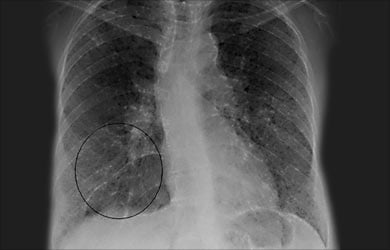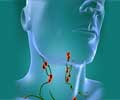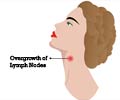- Why Are My Glands Swollen? - (http://www.webmd.com/a-to-z-guides/swollen-lymph-nodes-topic-overview)
- About Swollen lymph nodes - (http://www.mayoclinic.org/diseases-conditions/swollen-lymph-nodes/basics/causes/con-20029652)
- Swollen lymph nodes - (http://www.nlm.nih.gov/medlineplus/ency/article/003097.htm)
About
Lymph nodes play a vital role in the immune system of our body, by way of protecting from various infectious particles. These lymph nodes get swollen and become painful due to invasion into the body by bacteria, viruses, parasitic infections, fungi, certain autoimmune disorders, tumors etc. Any swollen lymph node that does not subside within 3-4 weeks should raise an alarm and it becomes necessary to get it evaluated thoroughly for its cause.

There are certain factors that need to be considered while examining a lymph node. They are:
- Size
- Consistency
- Mobility
- Distribution
Depending upon which organs are affected or confined to certain disease conditions a particular group of lymph nodes get enlarged, most commonly corresponding to location of the organ affected. Swollen lymph nodes/ Lymphadenopathy can be classified based on the location in which lymph nodes are affected:

- Cervical Lymphadenopathy
- Axillary Lymphadenopathy
- Supraclavicular Lymphadenopathy
- Mediastinal Lymphadenopathy
- Inguinal Lymphadenopathy
- Abdominal Lymphadenopathy
- Epitrochlear Lymphadenopathy
In case of advanced tumors, generalized lymphadenopathy is often noticed.
There are a number of conditions which manifest with swollen lymph nodes or lymphadenopathy. While infections cause lymph nodes to be tender, spread of cancer to a lymph node results in the lymph node becoming hard, non-tender and sometimes fixed to the underlying tissues. Autoimmune conditions like rheumatoid arthritis and systemic lupus erythematosus can also cause lymph node enlargement. Some of the conditions that cause enlarged lymph nodes are listed below:
- Infectious Mononucleosis- Infectious mononucleosis is caused by Epstein Barr virus. The patient presents with lymphadenopathy, sore throat and fever. Common findings on examination are enlarged lymph nodes at the back of the neck, armpit and groin regions with petechiae (reddish spots) over the soft palate and liver and spleen enlargement. Positive heterophile antibody test confirms the diagnosis.

- Hodgkin’s Lymphoma: Hodgkin’s lymphoma is a cancer of the lymph cells that presents with generalized or localized swelling of lymph nodes in the region or the neck and above the collar bones. Associated symptoms along include weight loss, fever, night sweats and itching. Diagnosis is made with biopsy of lymph node which shows Reed – Sterberg cells on microscopic examination.
- Mumps: Mumps is a viral infection common in childhood. It manifests with lymphadenopathy in the neck, under the jaw and the back side of the head, swollen and tender salivary glands and sore throat. Pharyngeal swab culture confirms the diagnosis. Serological tests are also useful for this purpose.
- Measles: Measles is a viral infection caused by paramyxovirus. Symptoms include rash, fever, cough, conjunctivitis with generalized lymphadenopathy. Rash is specific and is termed as koplik spots. Diagnosis is with nasopharyngeal swab culture and blood testing.
- Herpes Zoster infection: Herpes zoster infection is also called as shingles. It is of viral origin. The patient presents with lymphadenopathy in armpit, neck and back of the head along with a painful rash consisting of fluid-filled blisters. Diagnosis is often clinical. Direct fluorescent test for antibody and PCR test for virus detection are useful.
- Tuberculosis- Most commonly in tuberculosis, the lymph nodes in the neck are enlarged along with associated symptoms like productive cough, dyspnea, weight loss etc. The lymph nodes may have a matted appearance. Diagnosis is often made after clinical examination. Skin tuberculin test is useful in making diagnosis.
- Sarcoidosis- Most often sarcoidosis patients are asymptomatic, but in certain cases they might present with erythema nodosum and arthritis. Chest X-ray shows hilar lymphadenopathy. Biopsy of the involved tissue usually confirms the diagnosis.

- Apart from the conditions mentioned above, there are a number of other conditions that involve changes in the lymph node. Depending upon the location, size and mobility of the lymph node, further assessment can be made.
Any lymph node enlargement that is not subsiding after 3-4 weeks warrants complete evaluation with examination and investigations.
Frequently Asked Questions
1. What are swollen glands?
Swollen glands or swollen lymph nodes are nodules of lymph tissue which get enlarged due to infection, trauma or cancer. They are located all over the body. Depending upon which organ is affected, neighboring lymph nodes enlarge.
2. What is the role of lymph nodes in our body?
Lymph nodes play a vital role in our body’s ability to fight against infectious particles entering our system. If there are swollen lymph nodes, suspicion of some thing wrong should arise and evaluation must be initiated.
3. Which lymph nodes are commonly affected?
The most common lymph nodes that get affected are in head, neck region, armpits and groin region. But other lymph nodes can also be affected, depending upon the cause.
4. What are the common symptoms of swollen lymph nodes?
The common symptoms of swollen lymph nodes include pain in the lymph node and symptoms due to compression of the adjacent areas. Along with these, there are associated symptoms like fever, night sweats, loss of appetite, persistent cough, recurrent infections etc depending upon the cause for enlarged lymph nodes. A bacterial infection can cause abscess formation and result in ulceration of the lymph node.
5. What are the common conditions in which swollen glands are noticed?
Most commonly, infections cause swollen lymph nodes. Common among these include Adenovirus infection, cytomegalo virus, Epstein barr virus, chicken pox, staphylococcus, streptococcus, tuberculosis, sexually transmitted diseases, herpes, HIV etc.












